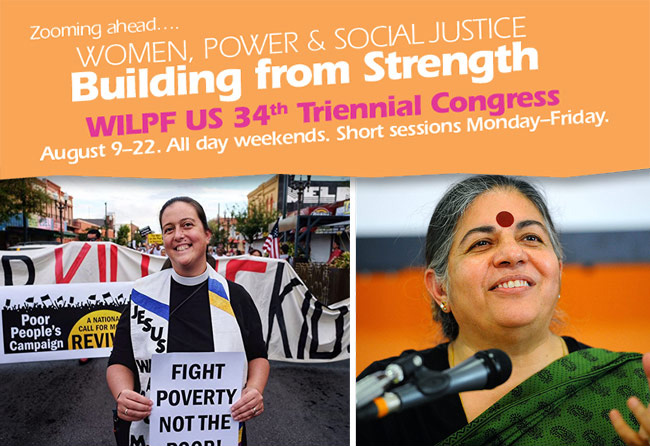34th Congress Program Overview
Published on May, 16 2021
Rev. Dr. Liz Theoharis (left), photo from her Amazon author page, and Vandana Shiva (right), Indian activist, environmentalist, and one of the main leaders of the International Forum on Globalization (IFG), photo credit: Giacomo Marini / Shutterstock.com.
The fifteenth suggestion in Chimamanda Ngozi Adichie’s “Dear Ijeawele, or a Feminist Manifesto in Fifteen Suggestions,” carries us to a common grounding. She writes: “Teach her about difference. Make difference ordinary. Make difference normal.”
As WILPF US celebrates its 34th Triennial Congress, we bring a desire to offer “difference” and especially a difference of opinion, “from an informed, humane, and broad-minded place,” as Ngozi Adichie puts it.
We are using a two-week format to make certain that all of those who want to speak about their passions, their work, and ideas can reach out to a larger and more diverse audience.
Note: Below are brief descriptions of the presentations. There will be a more complete list, with names and bios of panelists, coming soon.
The FIRST WEEK starts on Monday, August 9 with a series of How-To seminars. Then on Friday, August 13, we start our first weekend, focused on “Environmental Justice IS Social Justice,” with Rev. Dr. Liz Theoharis exploring the moral imperative for organizing to save our earthly Mother. We also lift up the voices of WILPF US members and branches who are working through the Poor People’s Campaign.
On Saturday, August 14, feminist environmentalist Vandana Shiva converses with Patti Naylor, an Iowa farmer, about eco-feminism and the economic chicanery of the agricultural-industrial complex. The conversation and Q&A is followed by an international examination of European Union, Paris Accords, United Nations actions, or inaction, on equity and empowerment and a critique of the upcoming UN Food Systems Summit. A short discussion on feminist foreign policy helps to focus on gender inequity and the need for change. The critique of US healthcare policies as opposed to Cuba is presented by a panel of experts on Cuba, showing us a different and better way to handle COVID, as well as better practices for women’s health. The Cuban presentation is followed by a heart-felt search for peace in Lebanon, interviews with Lebanese women, and the final presentation is a panel on feminist economic solutions to gain women the power of self-determination in these difficult times. Entertainment follows.
Sunday, August 15, opens with a conversation with Canadian Maude Barlow, chair of Food & Water Watch and co-founder of the Blue Planet Project, and Canadian Blue Communities with water activist Mary Grant, followed by Q&A.The following branches presentation clearly states the price we pay for the meat on the table along with the runoff of CAFOs on our land. Another immediate and long-lasting problem, radioactive pollution, is tackled by the Disarm! issue committee members. In the next presentation, the economic cost of pollution and corporate greed is countered by taking a new and more educated look at money. The green of money and the green of forests and the cost of climate is covered in a conversation with past WILPF International president Adilia Caravaca and a noted woman forester, Amara Espinoza from Costa Rica, ending the week. Entertainment: RAGING GRANNIES (Fresno).
The SECOND WEEK, starting on Monday, August 16, focuses on “Using Our Power for Peace,” which further illustrates the intersectionality of all our presentations. Intersectionality deals with the myriad plays of power within relationships of organizations and individuals.
Friday, August 20, features Paul Kivel, author of Uprooting Racism: How White People Can Work for Racial Justice, who will speak on transforming social justice, and the Philadelphia Branch presents a panel, “Breaking out of White Supremacy.”
Saturday, August 21, Barbara Arnwine and Jan BenDor bring their expertise on voting rights advocacy and social justice issues to the Congress (with Q&A). The San Diego Branch follows with a panel on deescalating the violence of the past administration. A panel of the leaders of the Black Caucus, George Friday and Theresa El-Amin, along with moderator, Rosa Saavedra, talks about their organizing and future. The president of WILPF Ghana, lawyer and poet Ayo Ayoola-Amale, talks about her poem “Breaking the Silence around Violence against Women.” Another panel comprises LGBTQ advocates who will speak on the issues surrounding transgender women of color and their successes and challenges. Shifting to a global-to-local view of the power of money, an international as well as national panel of speakers take another look at the military’s use of money and weapons at the expense of humankind. Ending the day with WILPF America’s representative, Beatriz Schulthess will remind us that colonialism is deeply embedded in the Americas.
Sunday, August 22, begins with WILPF US honoring our collaborative organizations and WILPF women (TBD). Interviews with Lebanese women and girls in a situation fraught with civil unrest, terrorism, economic crises, and COVID. Then we turn a panel speaking to US history of whitewashing indigenous deaths of children as well as an historic fictionalization of their past, present, and future. Lastly, we are hoping to connect with Daoud Nassar, a Palestinian farmer and hear about his children’s camp and his book about it. We have heard that, tragically, most of his olive trees were once again burned down.
We are hoping to have a theatrical presentation ending our two-week sessions.
Please remember, this a temporary description and will be replaced with updated information and biographies of speakers and panelists.



